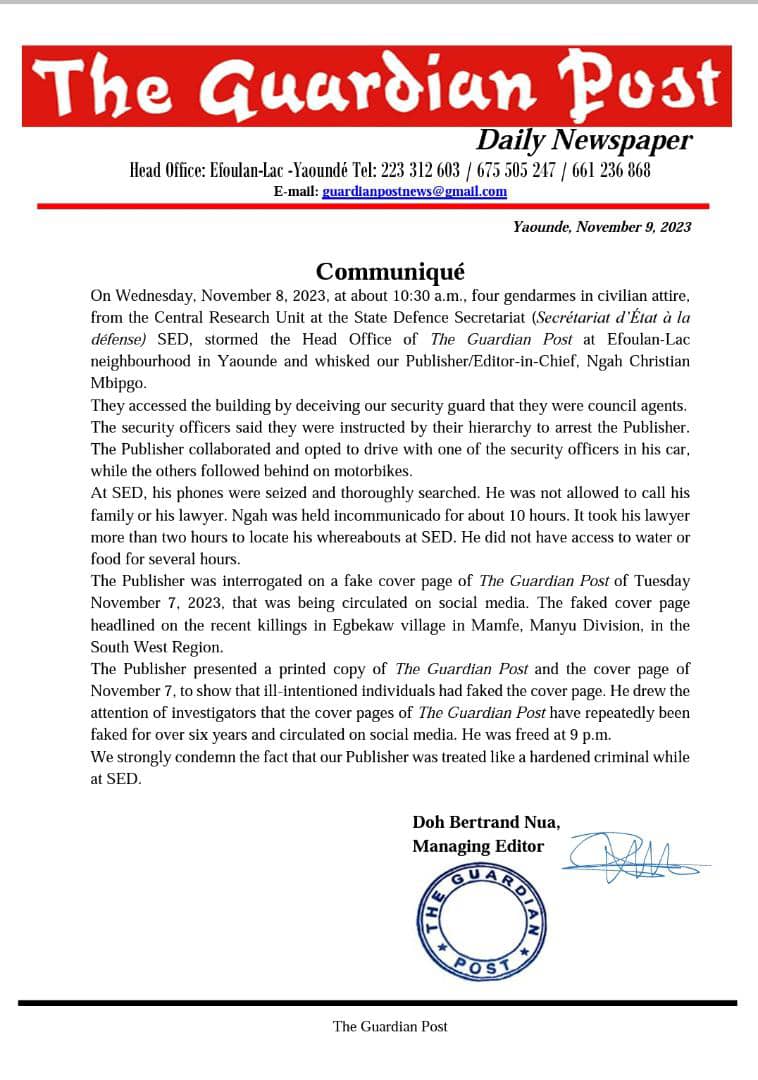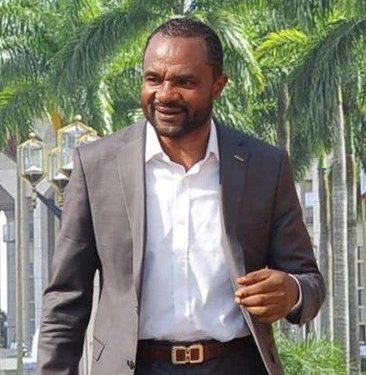The Guardian Post Newspaper has decried the treatment of its Publisher, Ngah Christian, “like a hardened criminal”, after gendarmes arrested and detained him incommunicado for 10 hours.
The incident occurred yesterday when Mr Ngah was arrested at the media organ’s headquarters in Yaounde by “armed Gendarmes in civilian attires”.
He was subsequently taken to the Central Research Unit at the State Defense Secretariat (SED).
At SED, they questioned him for about 10 hours, The Guardian Post said, and he wasn’t allowed to call his lawyer or family during that time.
In a release signed by Managing Editor, Doh Betrand today, The Guardian Post stated that he received neither food nor water.
“At SED, his phones were seized and thoroughly searched,” the release said.
“He was not allowed to call his family or his lawyer. Ngah was held incommunicado for about 10 hours. It took his lawyer more than two hours to locate his whereabouts at SED. He did not have access to water or food for several hours,” it furthered.
The Guardian Post said Ngah’s arrest was in connection with a fake front page of the November 7 edition of the English daily.

The altered front page reportedly distorted facts surrounding the recent massacre of over 25 civilians in Egbekaw, Mamfe. It aligned aligned the content with the Ambazonia separatist agenda
The Guardian Post’s management emphasized that the faked front page did not reflect the newspaper’s publication stance.
The incident marks a pattern of pro-Anglophone separatists altering front pages of newspapers perceived to be pro-government. The Guardian Post has been a repeated target.
The newspaper expressed dissatisfaction with authorities for not addressing previous complaints about the falsification of its content.
Although Ngah was released the same day, The Guardian Post criticized the humiliating treatment inflicted upon him during his detention.
Gov’t’s Repeated Panics Over Fake Newspaper Headlines
This incident occurs against the backdrop of a broader government crackdown on the press in Cameroon.
The bi-weekly newspaper, The Post, remains banned indefinitely in the South West Region due to a leaked front page.

Also, it faced a nationwide suspension for one month in September. An unpublished front page of the newspaper suggested that 66 percent of Cameroonians desired a military coup.
In a release banning The Post, the Governor of the South West, Bernard Okalia Bilai, accused the paper of “flagrant violation of professional norms governing mass communication”.
Two days after, the National Communication Council (NCC) slammed a one-month suspension on the paper.
It also suspended its publisher for one month for letting the coup story slip out of its editorial room.
International Condemnation
International condemnation has ensued, with rights defenders, including Reporters Without Borders, condemning the arbitrary and abusive actions by the Cameroonian government against the press.
The ban on The Post has triggered calls for its immediate lifting, highlighting concerns about press freedom and the treatment of journalists in the country.
In the past, Cameroonian journalists have suffered arrests, torture, detention and even death in connection with their work.
The targeting of The Guardian Post highlights government’s determination to silence the press in Cameroon.
Amina Hilda contributed to this report



